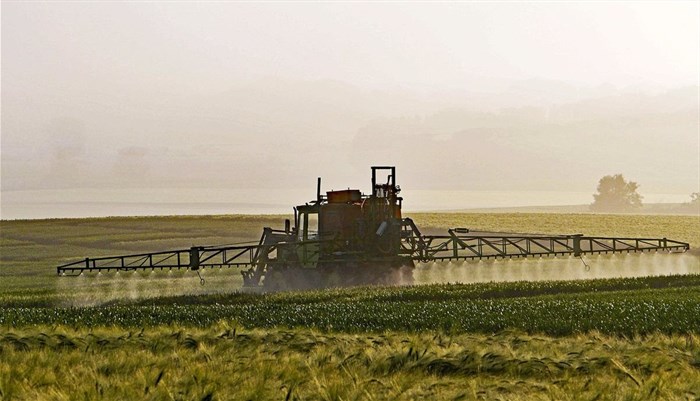Nanotechnology promises to help farmers cut pesticide use – but could also make chemicals more toxic

Pesticide products based on nanoscale materials – nano-enabled pesticides – are currently heralded as a promising new solution that could enhance the protection of crops from pests and disease, while posing minimal risk to the environment.
But, together with a team of environmental scientists, we argue in this new study that despite claimed sustainability benefits, adding nanomaterials to this equation is likely to do more harm than good.
High expectations and bold promises of enhanced efficiency and sustainability have surrounded nanotechnology since its initial large-scale commercialisation two decades ago. There is little doubt that nanotechnology has delivered on some of these criteria. Spectacular examples include applications in solar cells and batteries that help society transition away from fossil fuels.
At the same time, there is ample evidence of cases where the prefix “nano” has been over-hyped for marketing rather than scientific purposes. These range from overpromised efficacy of nanoparticles for cancer-targeting applications to downright scams where nano-products are sold under the claim of curing Covid.
More importantly, there are instances where the risks of nanomaterials to human and environmental health outweigh their benefits. Concerns regarding genotoxicity – or damage to DNA – recently resulted in a ban of titanium dioxide nanoparticles for use as food colourants in the EU.
Pesticides of any class warrant particular caution when it comes to risks to human health and the environment. In contrast to the majority of chemicals we produce, pesticides are designed to be toxic and are purposefully released to the environment.
Only a small fraction of pesticide applied reaches the pests being targeted under conventional agricultural practices – on average that volume ranges from less than 1% up to approximately 25%. The remaining fraction of applied pesticides often ends up polluting soils, groundwater and surface water. This poor efficiency represents a significant loss from both an economic and environmental perspective. It’s a waste.
The promise of nano-enabled pesticides
Nano-enabled pesticides claim to address this lack of efficiency. Packaging pesticide molecules in nanoscale carriers – less than one hundredth of the size of a grain of sand – could make pesticides stick or adhere better to crops. It could also improve their absorption into the tissues of pests.
The nanoscale carriers can be tailored to release the pesticide molecules they carry more slowly or restrict their release to occur only under the desired conditions. Consequently, nano-enabled pesticides could be equally or even more effective than conventional pesticide products when applied in lower volumes and less frequently. This cuts the amount of pesticide being released into the surrounding environment.
But reducing volumes is only part of the solution. As illustrated in our paper, many of the properties that improve the performance of nano-enabled pesticides in pest control may equally exacerbate their impacts on organisms other than the pests being targeted. Plainly put, little is gained from lowering levels of pollution, when the pollutants themselves are more harmful.
To illustrate, nano-enabled pesticides that are more readily taken up in the tissues of targeted pests can often be assumed to be more readily taken up by other organisms as well. Similarly, using nanoscale carriers to extend the durability of pesticides after application also increases the time pesticides will pollute the soil and freshwater. This has an impact on aquatic life, pollinators and natural predators of pest organisms.
The nanoscale carriers that are used may affect the environment as well. In a study published last year, we demonstrated that nanoscale carriers can adversely affect freshwater zooplankton in the long term. The behaviour of nanomaterials in the environment also tends to be less well known and harder to predict than for conventional chemicals. Due to their minuscule size, accurate routine monitoring of nanomaterial residues in the environment or on food is unfeasible.
Proceed with caution
The first nano-enabled pesticides have already entered the market in Canada and the US. More products and other regions such as the EU are likely to follow soon.
For better or worse, the agricultural sector could be on the cusp of a new era for pesticides. By acting now, regulators can prevent nano-enabled pesticides from becoming a regrettable path in the future of farming. Our paper outlines the benefits of nano-enabled pesticides, but emphasises their environmental risks and how these should be assessed.
While our role as environmental scientists is to improve our understanding of these consequences, we urge regulators to consider these risks when evaluating whether nano-enabled pesticides should be bought to market.
This article is republished from The Conversation under a Creative Commons license. Read the original article.![]()
Source: The Conversation Africa

The Conversation Africa is an independent source of news and views from the academic and research community. Its aim is to promote better understanding of current affairs and complex issues, and allow for a better quality of public discourse and conversation.
Go to: https://theconversation.com/africaAbout Tom Nederstigt and Martina G. Vijver
Tom Nederstigt, Postdoctoral research fellow, Leiden University.Martina G. Vijver, Professor of Ecotoxicology, Leiden University.




















